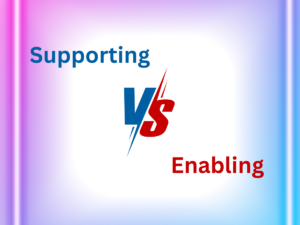Supporting Versus Enabling: What is the difference?
There are many ways you can help a loved one who is struggling, and some are more helpful than others. Have you ever questioned if your actions are supporting your loved one or if you are enabling their behaviours?
The word supporting can be defined as giving assistance to a person in need. On the other hand, enabling can be defined as encouraging dysfunctional behaviour. In the context of caregiving, supporting someone can be described as being there to guide and help an individual in need, while enabling someone means making their actions possible, even if said behaviours are detrimental.
Sometimes we might think we are helping our loved one, but instead we are actually enabling them. Read on to see how supporting and enabling are different from each other in practical terms.
Supporting someone
Recognizing that your loved one needs help: By recognizing this, you are acknowledging that they are experiencing something difficult and they need assistance. This tells them you see and hear them and that they are not alone.
Letting them know you are there for them: If your loved one understands that you are willing to devote time to them, they may feel more comfortable reaching out for help.
Connecting with them: Don’t be afraid to reach out to a person in need to see if they are doing okay. A call or even a simple text message can mean a lot. It tells your loved one that you are thinking of them and that they have someone to count on.
Empowering them: There are many ways you can do this, such as providing tools, resources, or teaching skills that can help them in their daily life. By sharing knowledge and letting them apply what they learned, the person you are helping will feel like they have more control over their actions.
Giving them the power to make decisions: By letting someone make decisions for themselves instead of telling them what to do, you are allowing them to be independent and encouraging them to feel more capable.
Enabling someone
Making excuses and lying for them: If your loved one does something wrong, gets in trouble, and you continually bail them out or give excuses, you are not giving them the chance to be accountable for their actions. By getting them out of such situations, you prevent them from facing the consequences of their wrong choices and learning from them.
Forcing someone to do something: You might think that this will be a sure way of getting your loved one the help they need, but it might do the exact opposite. It can deter your loved one from the pursuit of helpful avenues because it is something that is being pushed on them.
Accepting abuse from the person: If the person is taking advantage of you or being abusive and there are no consequences, they will have no reason to correct their behaviours.
Ignoring the issue/preventing a person from getting the treatment they need: If you don’t acknowledge that there is an issue that needs to be addressed, or if you are not allowing your loved one to seek the treatment they need, it will fuel the negative cycle of what they are going through. Recovery will be that much harder.
Sometimes we might not realize we are enabling; it can be hard to see when you mean well. Despite good intentions, the impact may not be what you are hoping for. This is when it’s wise to reflect on your actions and adjust as needed.
If you feel overwhelmed or don’t know how to support your loved one, we can help. Asking for help is a sign of strength. Visit amiquebec.org or call 514-486-1448.
–Gabrielle Lesage
Click here for references
Sign up for our emails to stay in touch
Please also follow us on:



